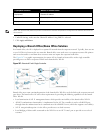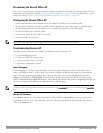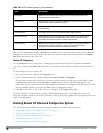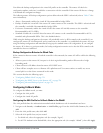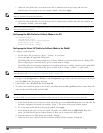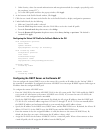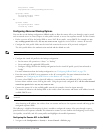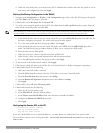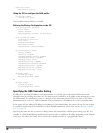
525 | Remote AccessPoints DellPowerConnectW-SeriesArubaOS6.2 | User Guide
c. Under the AAA profile that you created, locate 802.1x Authentication Server Group, and select the
authentication server group to use (for example “default”), then click Apply.
NOTE: If you need to create an 802.1x authentication server group, select new from the 802.1X Authentication Server Group drop-
down list, and enter the appropriate parameters.
d. Under the AAA profile that you created, locate 802.1X Authentication Profile, and select the profile to use
(for example, “default”), then click Apply.
NOTE: If you need to create an 802.1x authentication profile, select new from the 802.1X Authentication Profile drop-down list, and
enter the appropriate parameters.
Configuring the AAA Profile for Fallback Mode in the CLI
aaa profile <name>
initial-role <role>
authentication-dot1x <dot1x-profile>
dot1x-default-role <role>
dot1x-server-group <group>
Configuring the Virtual AP Profile for Fallback Mode in the WebUI
To configure virtual AP profile:
n Set the remote AP operation to “always,” “backup,” or “persistent.”
n Create and apply the applicable SSID profile.
The SSID profile for the backup configuration in always, backup, or persistent mode must be a bridge SSID.
When configuring the virtual AP profile, specify forward mode as “bridge.”
The SSID profile for the backup configuration in standard mode can be a bridge, tunnel, or split tunnel SSID.
When configuring the virtual AP profile, specify forward mode as “bridge,” “tunnel,” or “split tunnel.”
NOTE: When creating a new virtual AP profile In the WebUI, you can also configure the SSID at the same time. For information
about AP profiles, see "Understanding AP Configuration Profiles" on page 396.
1. Navigate to the Configuration > Wireless > AP Configuration page. Select either the AP Group or AP Specific
tab. Click Edit for the AP group or AP name.
2. Under Profiles, select Wireless LAN, then Virtual AP.
3. To create a new virtual AP profile in the WebUI, select New from the Add a profile drop-down menu. Enter the
name for the virtual AP profile, and click Add.
NOTE: Whenever you create a new virtual AP profile in the WebUI, the profile automatically contains the “default” SSID profile with
the default ESSID. You must configure a new ESSID and SSID profile for the virtual AP profile before you apply the profile.
a. In the Profile Details entry for the new virtual AP profile, go to the AAA Profile drop-down list and select the
previously configured AAA profile (for example, “logon”). The AAA Profile pop-up window appears.
b. To set the AAA profile and close the pop-up window, Click Apply.
c. In the Profile Details entry for the new virtual AP profile, select NEW from the SSID Profile drop-down
menu. The SSID Profile pop-up window displays to allow you to configure the SSID profile.
d. Enter the name for the SSID profile (for example, “backup”).
e. Under Network, enter a name in the Network Name (SSID) field (for example, “backup-psk”).



